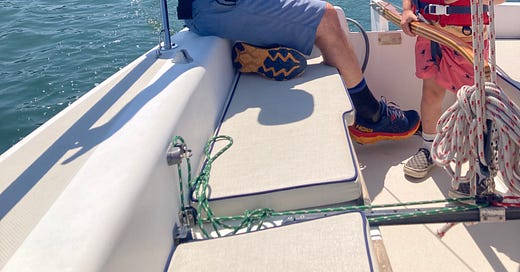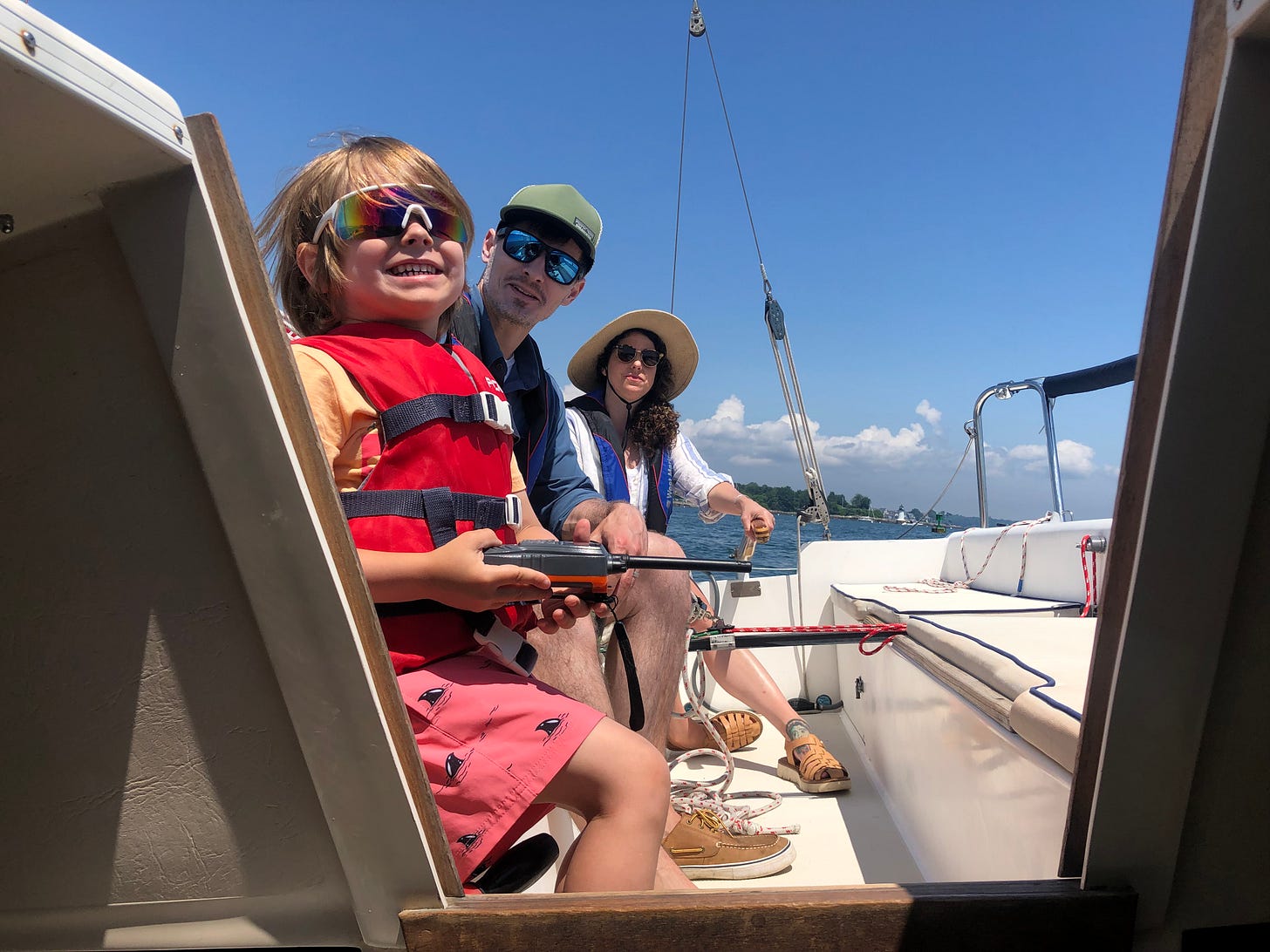For a brief moment, the rain stopped and the clouds cleared, offering a perfect sailing day. On this day, all was well in the world. I led the first ever “Therapeutic Sailing for Families,” outings for parents, siblings, and the children who are neurodiverse or who have autism.
The family of three and I met on the Village Street Dock in Marblehead for a group sail. I have been teaching therapeutic horse riding to the four-year-old boy, so I know him and his parents. I also know that for our adventure to be successful, I needed to have a written plan of our outing.
The boy, who I will call Nico, has sensory-seeking behavior. I knew that I had to give him jobs and keep him moving. I made him the first mate, his mother the second mate and his father the third mate.
His parents are the real stars. They signed themselves and Nico up for this adventure and gave him a week to allow his body to become comfortable wearing a life jacket. He showed up wearing his life jacket. Since he was the first mate, I instructed him to give life vests to all the adults.
We were ready to depart the dock. I asked Nico to sit next to the tiller while I started the outboard engine. As he had his hand on the tiller, he quickly noticed the vibration from the engine.
Once free and clear from the dock, I gave Nico his first task: steer the boat with the tiller as I steered using the engine for assistance. He quickly learned that by pushing the tiller away from him, the boat would turn in the opposite direction. I gave him his second task: make a complete circle around an unoccupied mooring ball. He did so with ease. I praised him and said I would have to pay him as my first mate. Nico responded that I need to pay him one hundred and four.
Nico knew nothing about sailing at this point except what he was learning. More importantly, he was having fun and wanted to know more. So often, we adults are determined to push our agenda without any respect to the participant.
With experiential learning, students learn through action, learn by doing, learn through experience, and learn through discovery and exploration. Many students will retain what they learn more deeply and find ways to apply it to other things they learn. Nico, who is autistic, retains information on a massive scale. He is a human sponge, which is the challenge.
Nico often becomes dysregulated with too much input and not enough movement. He will become quiet and less engaged when dysregulated. Since I had previous experience working with him, I knew movement was key. Nico learned when he moved on the boat that he had to always have three points of contact to be safe.
Now that we were in the middle of the harbor, we raised the sails and shut off the motor. I gave Nico a choice as to which parent should help him with the tiller. He chose his father. Another goal of Therapeutic Sailing for Families is the family has a chance to work together and have a shared experience.
In a functional family, everyone feels safe and respected. A sailboat is a floating universe and whoever is on it becomes part of the family. When all work together on a boat, time is unlimited. All feel at peace. Dreams are reborn.
This was also the first time sailing for both parents. After they had the opportunity to take the tiller on their own and tack the boat a few times, we headed back to the mooring. I gave the family a choice. Should we sail or motor to the mooring? Nico gave a definite, “Motor!” His vote was the clear winner so I started the motor and we dropped the sails.
I gave Nico the tiller and I asked his father to stand on the bow with the boat hook as I gave instructions to catch the mooring. We tied off and started to de-rig the boat.
Again I showed Nico the plan for the day. He studied it with me as I read it. The final task was to call the launch for a ride back to the dock. Nico had been fascinated with the marine radio the entire trip. As the first mate, I gave him the task to call the launch.
We practiced what to say several times. I asked him to repeat back what he practiced. I showed him how to change the channels on the radio and press the talk button. As he spoke on the radio, I quietly reminded him of the words to say. The launch driver responded to his call and soon met us at the boat.
To a four-year old, this is earth shattering to transmit a message and have a boat appear. When we boarded the launch, we asked the launch driver how he knew we were calling him and how to find us. Nico was listening intently.
We got back to the dock and Nico jumped up and down exclaiming, “That was SO much fun!”
His mother shared this with me later that day, “my husband and I were actually very nervous at first on how everything would go. Your calm captaining kept his nervous system in check. Thank you.”
Sailing is one of the gifts I like to share with others. If you have a child who is neurodiverse in your family and would like to learn more about Therapeutic Sailing for Families, you may book a free consultation call if you click here.






Learning about how to be a team while sailing a boat under Cam's teaching can offer transferable skills in school and the home. This is inspiring!!
Wow! Nico and his parents responded so well to your carefully written and kindly executed lesson plan! Great job!